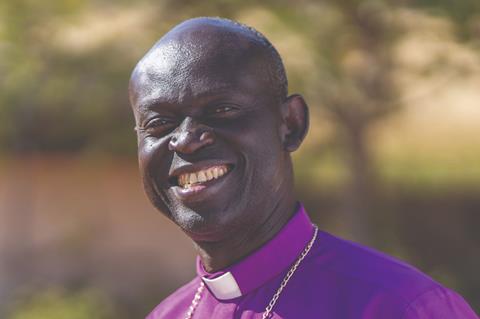When civil war ravaged South Sudan and displaced his community, Rt Rev Joseph Aba, Bishop of Liwolo, followed his people into exile. He says God is powerfully at work in the Ugandan refugee camp in which he now ministers

Bishop Aba has lived through three civil wars and for the last six years has been living in a refugee camp. But, despite the hardships, he is not bitter, nor has he lost hope in God’s plan for the future of his country.
When South Sudan declared its independence in 2011, there was hope that the bloody civil wars that had engulfed the region for 50 years would finally end. But two years after independence, a power struggle within the ruling party – largely made up of the majority Dinka tribe – and ethnically targeted violence from armed militia plunged the country back into conflict. More than 400,000 people have since died in the South Sudanese Civil War, which the UK government declared a genocide in 2017.
Bishop Aba was among the 2.2 million people who fled the country in order to escape what the UN has described as “ethnic cleansing, mostly from government forces and their allies” and the conflict-related famine that has now displaced more than a third of the population.
FIGHTING AND FAMINE
Born during the first Sudanese civil war (1955-1972), Aba’s childhood was irrevocably shaped by conflict. He was about to finish school when, in 1983, the second civil war plunged the country back into bloodshed. When fighting and famine reached his village, “the future looked dark,” he says. “I didn’t know what to do.”
At the time, he “did not know Jesus deeply” but enjoyed singing and was part of his church choir. When he was invited to lead worship at a Christian conference, God met with him in a powerful way. “God opened my eyes…I didn’t know what it meant to be born again, or what the cost was,” he explains. “But the Spirit of God was so strong. I said yes to Jesus. That revolutionised my life. The Lord Jesus was able to turn the hopelessness into hope.”
By May 2017, Aba was a priest in the Anglican Episcopal Church and about to be consecrated Bishop of Liwolo, a diocese in the Central Equatorian province of South Sudan. But fighting had reached the region and was wreaking havoc.
His first job as bishop was to officiate at the funeral of a community leader shot dead by armed forces. Just three days later, a mass exodus began. “All the people left,” he says. Driven from the area by the mass atrocities being inflicted by government forces and armed militia, the nearly 20,000-strong population was decimated as people sought safety in neighbouring Uganda.
Faced with the displacement of his diocese, Aba made the heart-breaking decision to leave South Sudan in order to continue ministering to his flock. “I joined my people in exile,” he recalls. Nearly six years later, he remains in a Ugandan refugee camp. “This is what God has called me for,” he says, “to bring hope to the hopeless.”
A PROPHETIC VISION
Despite the tragic circumstances, God is at work, says Aba, and has always gone before him. In 2011, as the country celebrated independence, Aba had a vision that would prepare him for the struggle ahead: “God told me: ‘You don’t need to celebrate this independence, because it will do nothing for you and your people. You will be pushed out of the country and you will be in Uganda as refugees for some time. And until the time comes, that’s when you can lead your people home.’
“God was very, very clear on this,” he says. “And indeed, now I am seeing the hand of God at work.”
Aba has pastoral oversight of 117,000 refugees who are living in the bush and across several camps, including the UN’s Imvepi Refugee Settlement. Half attend his churches.Despite the challenges of ministering among some of the poorest people on earth, the church is growing “very strongly”. The bishop confirmed an astonishing 2,000 people last year alone, including on one occasion, 600 young people at once.
GOD HAS CALLED ME to bring hope to the hopeless
Young people make up the largest part of Aba’s congregation, and he sees communicating the hope of the gospel to them as his top priority. “How will South Sudan look when I am not there?” he asks. “My strategy is to work with young people, teach them the gospel, disciple them. Our focus is transforming the nation of South Sudan through young people.”
Worshipping God in exile results in a beautiful “mixture of joy and lamentation, all at the same time,” Aba says. Referencing the ongoing conflict in his home country, he says the church gathers each week to “repent of the sins of our ancestors, and the sins we have committed that have caused all this pain to us. And we celebrate, because God is gracious; despite all of this, he is still sustaining us.”
As a fragile peace begins to emerge, Aba is hopeful for the future of his country. He will shortly return to appoint a new curate to a church in the region that has not held a service in six years. “It is very significant,” he says, a “clear indicator that we are coming home to rebuild our country.”
And while there is still a long way to go until Liwolo is fully restored, Bishop Aba is confident that he has been appointed “for such a time as this” (Esther 4:14). Like Moses, he has led people through the wilderness, but now he’s looking to the future. “I’m looking forward to seeing the God of Joshua, who leads the people home and resettles them. I’m looking forward to seeing the God of Nehemiah, the God of Ezra, who rebuilds the regions of their own country.”






































No comments yet